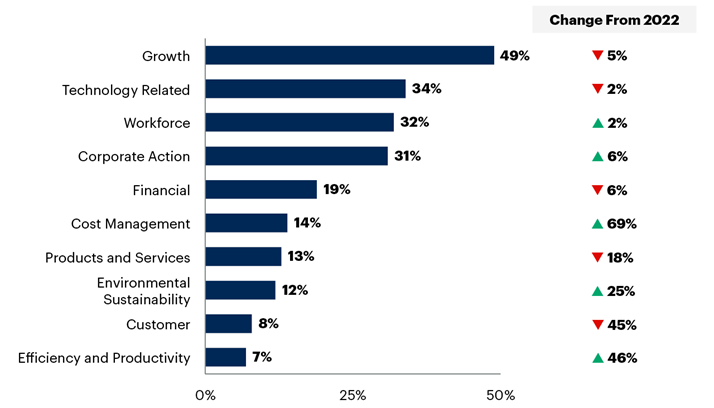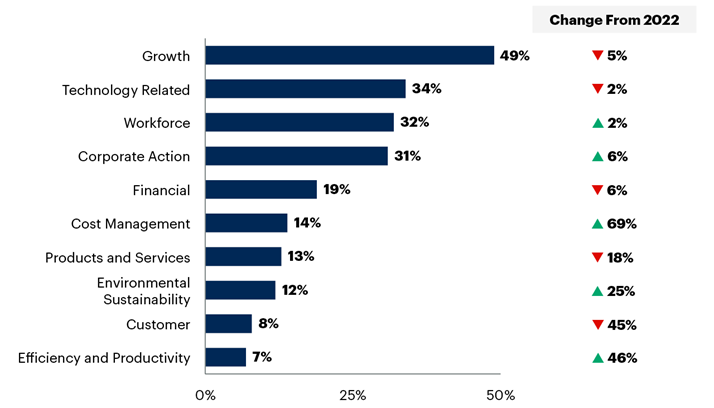- Growth is the Top Strategic Business Priority for Half of CEOs
- Majority of CEOs Believe an Economic Downturn or Recession Will be Shallow and Short
- Inflation and Price Sensitivity Creating the Biggest Shifts in Customer Behavior
A recent survey of CEOs and senior executives by Gartner, Inc. revealed that artificial intelligence (AI) was the top technology that CEOs believe will significantly impact their industry over the next three years, cited by 21% of survey respondents.
“Generative AI will profoundly impact business and operating models,” said Mark Raskino, Distinguished VP Analyst at Gartner. “However, fear of missing out is a powerful driver of technology markets. AI is reaching the tipping point where CEOs who are not yet invested become concerned that they are missing something competitively important.”
The 2023 Gartner CEO and Senior Business Executive Survey was conducted from July through December 2022 among over 400 CEOs and other senior business executives in North America, Europe, Asia/Pacific, Latin America, the Middle East and South Africa, across different industries, revenue and company sizes.
Half of CEOs Cite Growth as Their Top Strategic Business Priority
“When determining business priorities, CEOs are hesitant, but not frozen,” said Kristin Moyer, Distinguished VP Analyst at Gartner. “More than half of CEOs believe an economic downturn or recession in 2023 will be shallow and short, and the survey showed only a modest rise in cash flow, capital and fundraising concerns.”
Despite the impact of these economic headwinds, half of CEOs cited growth as the top strategic business priority for the next two years. Technology also remains a top focus area for CEOs, closely followed by workforce issues (see Figure 1).
Fig. 1: CEOs’ Top Strategic Business Priorities for 2023-2024 (Sum of Top Three Mentions)

Source: Gartner (May 2023)
“After three years of volatility, CEO priorities are stabilizing,” said Raskino. “Executive leaders are looking past the aftershocks of the omnicrisis period to a time when talent, sustainability and next-level digital change will be the levers of competitive performance.”
In fact, mentions of environmental sustainability rose 25% over the previous year’s survey, which was the first time sustainability ranked among CEOs’ top 10 priorities. Gartner predicts that by 2026, environmental sustainability will be a higher CEO strategic business priority than the technology-related category.
Inflation Drives Shifts in Customer Behavior
Inflation was ranked as the most damaging business risk by 22% of CEOs, and nearly a quarter cited greater price sensitivity as the biggest shift in customer expectations they anticipate this year. However, increasing prices is still the top action that CEOs are taking in response to inflation (44%), followed by cost optimization (36%) and productivity, efficiency and automation (21%).
“It’s concerning that CEOs do not yet seem to be focused on productivity as much as they should be in an inflationary period,” said Moyer. “This may be due to wishful thinking that inflation will not become a persistent feature of the economic landscape. CEOs must embrace automation to redesign methods, processes and products for efficiency, rather than pushing cost increases onto customers.”
Attracting and Retaining Talent Is the Top Workforce Priority
When asked about the impact of various risks on the business, 26% of CEOs cited the talent shortage as the most damaging risk for their organization. Attracting and retaining talent is, by far, CEOs’ top workforce priority. Concerns about compensation are the biggest shift in employee and prospective employee behavior that CEOs anticipate, followed by a desire for greater flexibility and remote or hybrid work.
“The emphasis on pay is not surprising in an inflationary environment, but in prior economic cycles, unemployment would typically be undermining labor market power,” said Raskino.
Follow news and updates from Gartner for IT Executives on Twitter and LinkedIn using #GartnerIT. Visit the IT Newsroom for more information and insights.
- ครึ่งหนึ่งของบรรดาซีอีโอเผยว่า “การเติบโต (Growth)” เป็นกลยุทธ์ทางธุรกิจที่มีความสำคัญเป็นอันดับแรก
- ซีอีโอส่วนใหญ่เชื่อมั่นว่าภาวะเศรษฐกิจตกต่ำและถดถอยจะเกิดขึ้นเพียงช่วงสั้น ๆ และส่งผลกระทบไม่ลึก
- ปัญหาเงินเฟ้อและความอ่อนไหวด้านราคากำลังทำให้พฤติกรรมลูกค้าเปลี่ยนแปลงครั้งใหญ่ที่สุด
การ์ทเนอร์เผยผลสำรวจของซีอีโอและผู้บริหารระดับสูง พบว่า 21% ระบุว่าปัญญาประดิษฐ์ (Artificial Intelligence หรือ AI) เป็นเทคโนโลยีสำคัญที่สุดและเชื่อว่าจะส่งผลกระทบอย่างมากต่ออุตสาหกรรมไปในอีก 3 ปีข้างหน้านี้
มาร์ค ราสกิโน รองประธานฝ่ายวิจัยของการ์ทเนอร์ กล่าวว่า “Generative AI จะส่งผลกระทบอย่างสูงต่อธุรกิจและรูปแบบการดำเนินงานต่าง ๆ อย่างไรก็ตามความกลัวที่จะตกเทรนด์หรือพลาดโอกาสทางธุรกิจกลับเป็นปัจจัยขับเคลื่อนสำคัญของตลาดเทคโนโลยี โดย AI กำลังเข้าไปสู่จุดที่ผู้บริหารที่ยังไม่ลงทุนในเทคโนโลยีนี้เริ่มกังวลว่าพวกเขาอาจพลาดบางสิ่งที่สำคัญในการแข่งขัน”
The 2023 Gartner CEO and Senior Business Executive Survey เป็นรายงานประจำปี จัดทำขึ้นเพื่อสำรวจมุมมองของบรรดาผู้บริหารธุรกิจอาวุโสกว่า 400 ราย ครอบคลุมกลุ่มอุตสาหกรรม ที่มีรายได้และขนาดองค์กรแตกต่างกัน จากทั้งภูมิภาคอเมริกาเหนือ (North America), ยุโรป, เอเชียแปซิฟิก ตะวันออกกลางและแอฟริกาใต้
ครึ่งหนึ่งของซีอีโอมองว่า “Growth” คือ กลยุทธ์ทางธุรกิจที่มีความสำคัญอันดับแรก
คริสติน โมเยอร์ รองประธานฝ่ายวิจัยของการ์ทเนอร์ กล่าวว่า “เมื่อต้องจัดลำดับความสำคัญของการดำเนินธุรกิจ ซีอีโอรู้สึกลังเลแต่ยังเดินหน้าไปต่อ โดยซีอีโอเกินครึ่งเชื่อว่าภาวะเศรษฐกิจตกต่ำและถดถอยในปีนี้จะกินเวลาช่วงสั้น ๆ และผลสำรวจยังเผยให้เห็นว่ากระแสเงินสด เงินทุน และการระดมทุนมีการเพิ่มขึ้นเล็กน้อย”
แม้องค์กรจะเผชิญกับผลกระทบทางเศรษฐกิจที่ถาโถมเข้ามา แต่ครึ่งหนึ่งของผู้บริหารระดับสูงระบุว่าการเติบโต (Growth) เป็นความสำคัญเชิงกลยุทธ์ทางธุรกิจอันดับแรกในอีกสองปีข้างหน้านี้ โดยยังให้ความสำคัญกับเทคโนโลยีอยู่ในอันดับต้น ๆ รองลงมา คือ ประเด็นด้านแรงงาน (ดูรูปที่ 1)
รูปที่ 1: สิบอันดับความสำคัญเชิงกลยุทธ์ทางธุรกิจของซีอีโอ ช่วงปี 2566-2567 (รวมคำตอบสามอันดับแรก)

ที่มา: การ์ทเนอร์ (พฤษภาคม 2566)
“หลังสามปีแห่งความผันผวน การจัดลำดับความสำคัญในการดำเนินธุรกิจของซีอีโอเริ่มมั่นคง โดยผู้นำในระดับผู้บริหารกำลังมองทะลุผ่านช่วงเวลาวิกฤตรอบด้านไปสู่ช่วงเวลาแห่งการขับเคลื่อนการแข่งขันในยุคถัดไปที่ยึดพนักงานที่มีความสามารถ (Talent) ความยั่งยืน (Sustainability) และการเปลี่ยนแปลงทางดิจิทัล (Digital Transformation) เป็นปัจจัยขับเคลื่อนและสร้างความได้เปรียบในการแข่งขัน โดยมีการกล่าวถึงความยั่งยืนด้านสิ่งแวดล้อมเพิ่มขึ้น 25% จากการสำรวจเมื่อปีก่อน นับเป็นครั้งแรกที่ความยั่งยืนติด 10 อันดับแรกของความสำคัญเชิงกลยุทธ์ทางธุรกิจ และการ์ทเนอร์คาดการณ์ว่า ภายในปี 2569 ความยั่งยืนด้านสิ่งแวดล้อมจะมีความสำคัญสูงกว่าหมวดเทคโนโลยีที่เกี่ยวข้อง
เงินเฟ้อดันพฤติกรรมลูกค้าเปลี่ยน
ซีอีโอ 22% ระบุว่าเงินเฟ้อ (Inflation) เป็นความเสี่ยงที่สร้างความเสียหายต่อธุรกิจมากที่สุด และเกือบหนึ่งในสี่ของบรรดาซีอีโอคาดการณ์ว่าในปีนี้ความอ่อนไหวด้านราคา (Price Sensitivity) ที่สูงขึ้นสร้างการเปลี่ยนแปลงครั้งใหญ่สุดต่อความคาดหวังของลูกค้า อย่างไรก็ตามการเพิ่มราคาสินค้าและบริการยังเป็นแนวทางรับมือกับปัญหาเงินเฟ้อที่มีความสำคัญที่สุด (44%) ตามด้วยการเพิ่มประสิทธิภาพต้นทุน (36%) และการเพิ่มประสิทธิผล รวมถึงการเพิ่มประสิทธิภาพและการใช้ระบบอัตโนมัติ (21%)
“เป็นเรื่องน่ากังวลที่ซีอีโอดูเหมือนจะไม่ให้ความสำคัญกับประสิทธิผลมากเท่าที่ควรในช่วงภาวะเงินเฟ้อ หรืออาจเป็นเพราะพวกเขามองว่าปัญหาเงินเฟ้อจะไม่กลายเป็นปัจจัยถาวรของภูมิทัศน์ทางเศรษฐกิจ ผู้นำและซีอีโอต้องนำระบบอัตโนมัติมาปรับใช้เพื่อออกแบบวิธีการทำงาน สร้างกระบวนการและผลิตภัณฑ์ใหม่ ๆ ให้มีประสิทธิภาพ แทนที่การผลักภาระต้นทุนไปให้ลูกค้า” โมเยอร์ กล่าวเพิ่มเติม
การดึงดูดและรักษาบุคลากรที่มีความสามารถเป็นสิ่งที่สำคัญสูงสุดต่อทีมงาน
เมื่อถามถึงผลกระทบของความเสี่ยงต่าง ๆ ที่มีต่อธุรกิจ ซีอีโอ 26% ระบุว่าการขาดแคลนบุคลากรเป็นความเสี่ยงที่สร้างความเสียหายให้องค์กรมากที่สุด ดังนั้นการดึงดูดและรักษาบุคลากรที่มีความสามารถจึงเป็นสิ่งที่ผู้บริหารควรให้ความสำคัญสูงสุด โดยความกังวลเกี่ยวกับค่าตอบแทนคือการเปลี่ยนแปลงใหญ่สุดของพนักงานและพฤติกรรมของพนักงานในอนาคต รองลงมาคือ ความต้องการความยืดหยุ่นมากขึ้น และการทำงานระยะไกลหรือไฮบริด
“ท่ามกลางสภาวะเงินเฟ้อจึงไม่น่าแปลกใจเลยที่ค่าจ้างมีความสำคัญมาก แต่ในวงจรเศรษฐกิจก่อนหน้านี้ ปัญหาการว่างงานมักจะบ่อนทำลายอำนาจของตลาดแรงงาน” มาร์ค ราสกิโน กล่าวเพิ่มเติม


